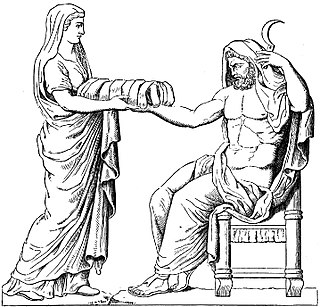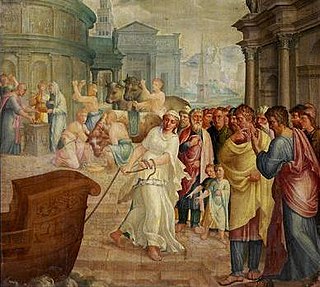Magna Mater is a Latin name for the Anatolian mother goddess Cybele.
Magna Mater may also refer to:

In ancient Greek mythology and religion, Persephone, also called Kore or Cora, is the daughter of Zeus and Demeter. She became the queen of the underworld after her abduction by and marriage to her uncle Hades, the king of the underworld.

Rhea or Rheia is a mother goddess in ancient Greek religion and Greek mythology, the Titaness daughter of the earth goddess Gaia and the sky god Uranus, himself a son of Gaia. She is the older sister of Cronus, who was also her consort, and the mother of the five eldest Olympian gods Hestia, Demeter, Hera, Poseidon and Zeus; and Hades, king of the Underworld.

Cybele is an Anatolian mother goddess; she may have a possible forerunner in the earliest neolithic at Çatalhöyük. She is Phrygia's only known goddess, and was probably its national deity. Greek colonists in Asia Minor adopted and adapted her Phrygian cult and spread it to mainland Greece and to the more distant western Greek colonies around the 6th century BC.

In ancient Roman religion, Ceres was a goddess of agriculture, grain crops, fertility and motherly relationships. She was originally the central deity in Rome's so-called plebeian or Aventine Triad, then was paired with her daughter Proserpina in what Romans described as "the Greek rites of Ceres". Her seven-day April festival of Cerealia included the popular Ludi Ceriales. She was also honoured in the May lustration (lustratio) of the fields at the Ambarvalia festival: at harvest-time: and during Roman marriages and funeral rites. She is usually depicted as a mature woman.

A gallus was a eunuch priest of the Phrygian goddess Cybele and her consort Attis, whose worship was incorporated into the state religious practices of ancient Rome.
Siris may refer to:

In ancient Roman religion Victoria was the deified personification of victory. She first appears during the first Punic War, seemingly as a Romanised re-naming of Nike, the goddess of victory associated with Rome's Greek allies in the Greek mainland and in Magna Graecia. Thereafter she comes to symbolise Rome's eventual hegemony and right to rule. She is a deified abstraction, entitled to cult but unlike Nike, she has virtually no mythology of her own.

Attis was the consort of Cybele, in Phrygian and Greek mythology.
Māra is the highest-ranking goddess in Latvian mythology, the ancient Dawn-goddess, previously called Austra, and, not at all, although often stated, the same as Zemes māte.
Great Mother may refer to:
In Greek mythology, two sacred mountains are called Mount Ida, the "Mountain of the Goddess": Mount Ida in Crete, and Mount Ida in the ancient Troad region of western Anatolia, which was also known as the Phrygian Ida in classical antiquity and is mentioned in the Iliad of Homer and the Aeneid of Virgil. Both are associated with the mother goddess in the deepest layers of pre-Greek myth, in that Mount Ida in Anatolia was sacred to Cybele, who is sometimes called Mater Idaea, while Rhea, often identified with Cybele, put the infant Zeus to nurse with Amaltheia at Mount Ida in Crete. Thereafter, his birthplace was sacred to Zeus, the king and father of Greek gods and goddesses.
Great Goddess is the concept of an almighty goddess or mother goddess, or a matriarchal religion. Apart from various specific figures called this from various cultures, the Great Goddess hypothesis, is a postulated fertility goddess supposed to have been worshipped in the Neolithic era across most of Eurasia at least. Scholarly belief in this hypothesis has reduced in recent decades, though theological belief in a Great Goddess is common in the Goddess movement.

Maia, in ancient Greek religion and mythology, is one of the Pleiades and the mother of Hermes, one of the major Greek gods, by Zeus, the king of Olympus.
Dea is the Latin word for "goddess" and may refer to:
Divine Mother or Mother Divine may refer to:

The Temple of Cybele or Temple of Magna Mater was Rome's first and most important temple to the Magna Mater, who was known to the Greeks as Cybele. It was built to house a particular image or form of the goddess, a meteoric stone brought from Greek Asia Minor to Rome in 204 BC at the behest of an oracle and temporarily housed in the goddess of Victory's Palatine temple. The new temple was dedicated on 11 April 191 BC, and Magna Mater's first Megalesia festival was held on the temple's proscenium.
Ceto may refer to:

Quinta Claudia was a Roman matron said to have been instrumental in bringing the goddess Cybele, "Great Mother" of the gods from her shrine in Greek Asia Minor to Rome in 204 BC, during the last years of Rome's Second Punic War against Carthage. The goddess had been brought in response to dire prodigies, a failed harvest and the advice of various oracles. Roman histories and stories describe Quinta Claudia as castissima femina in Rome, chosen along with Scipio Nasica, Rome's optimus vir to welcome the goddess.
Dione is the name of four women in ancient Greek mythology, and one in the Phoenician religion described by Sanchuniathon. Dione is translated as "Goddess", and given the same etymological derivation as the names Zeus, Diana, et al. Very little information exists about these nymphs or goddesses, although at least one is described as beautiful and is sometimes associated with water or the sea. Perhaps this same one was worshiped as a mother goddess who presided over the oracle at Dodona, Greece and was called the mother of Aphrodite.